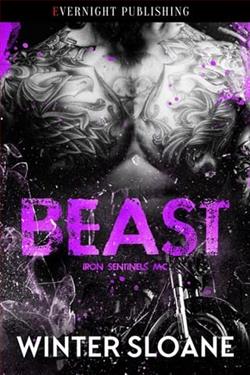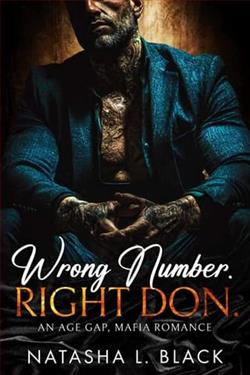Page 8 of HeartTorn
“What happened?” she breathes. There’s no trace of song in her voice now. “Who were those people?”
I shake my head. I don’t know how to explain.
Rather than answer, I turn away from her and her questions. Elydark stands blowing smoke through his widened nostrils, fire flickering in his mane. An open gash in his flank bleeds silver blood in long, shining streams.
I go to him, place my hand on the wound, and close my eyes.I’m sorry, my friend,I say, singing my sorrow into his head. I should never have let him get near you.
It was not your fault, Vellar.His great head turns to nudge my shoulder gently.Ilanthor was a fierce warrior.
He was indeed. He’s also been dead these last three years, slain on the same battlefield where I left Shanaera’s gutted corpse. His body, hers, and the those of all the Licornyn warriorswe lost that day were never retrieved, never given proper funeral rites.
But that in no way explains why they should walk the paths of Wanfriel once more.
My mind is so full of questions and half-formed terrors, it takes all the self-command I possess to still it for what I must do. Long years of training come to my aid, however. I begin to sing in a low voice. Immediately the soul-connection between me and my licorneir lights up. His own healing power flows through me, pouring from my palm back into his wound. The flesh knits, neatly and simply, leaving behind only silver bloodstains against his pale hide. Elydark shakes his mane. The last of the soulfire, which had enveloped his body in battle, vanishes from sight, though I know full well it remains as hot as ever beyond my perception. We look into each other’s eyes, both feeling more than we can express. Our shared song is one of wordless comfort, a reminder that, whatever may come next in our lives, we will face it together.
But the shock of those dead, rotten faces, the horror of what they mean, reverberates in my chest like the rumble of doomsday drums.
Was it really them, Elydark?I ask, hoping against hope he will contradict what my eyes have seen.Was it a Miphates trick? An illusion, a curse?
I fear not,he replies with deep sorrow.The songs of their souls were broken but recognizable. That is not something even a great Miphates mage could replicate.
He’s right. I have seen Miphates generate illusions so powerful, they can fool even the fae. But while they may construct a convincing simulacrum, down to the last freckle, inflection, or scent, no magic could simulate the unique vibration of a soul.
So it must be true then. Ilanthor, Naerel, and Morinar . . . my friends, my comrades-in-arms. I rode with them on many a campaign, but when, three years ago, I forbade my riders from taking the virulium dose before battle, Naeral joined with Shanaera in refusal. The demon’s blood held her in such thrall, she foreswore her oaths to me, her king, choosing instead the glorious violence to be had from each black vial. In this she, and all those who followed Shanaera, were traitors, one and all.
Ilanthor and Morinar stayed true to me, however. They suffered the withdrawals, came through stronger than ever, and rode with me to the battle of Agandaur. There we faced nearly impossible odds, only to be brought unexpected hope when the fighting was at its thickest. Shanaera arrived, leading her rebel crew to fight alongside my loyal chieftains and warriors. She still dreamed of liberation from the Miphates, still longed more than anything to soak the ground with mage blood.
But, as always happens with virulium in the end, that final dose took her and her people too deep. Lost in bloodlust, they ceased to discern friend from foe, turning on each other and my own warriors in their furious need for violence. Naerel slew Morinar before succumbing to Ilanthor’s blade. Ilanthor himself was hewn down by Shanaera soon after.
As for Shanaera? She fell to my sword. Driven through her gut. And I held her in that battlefield as the life left her, my tears mingling with the black virulium streaks on her cheeks.
Is it possible she’s still out there? Is she, like these three, trapped in a body of death and decay, walking the living world?
I saw her. Gods damn me, I saw her the night of the temple attack. She threw back that crimson hood to reveal her face, and the shock of it was enough to freeze my limbs, giving her a chance to escape with Mage Artoris in her arms.
In the hours and days that followed, I told myself time and again that this moment was nothing more than a fever-visioncaused by the madness of battle. Because, dead or undead, Shanaera would never help a Miphato. None of them would. They laid down their lives in the desperate hope that we might drive the Miphates from our land once and for all.
But on that moonlit plain below the temple mount, crimson-cloaked riders fought and slew my people at Mage Artoris’s command. And when we slew them back, they rose again to redouble their attack. Only decapitation broke whatever spell was on them—a spell ofnecroliphondeath magic the likes of which I have never before seen.
Slowly, almost unwillingly, I reach into my belt and pull out the silver ring which Naerel had tossed me. Delicately wrought of silver leaves supporting a citrine stone, it is the last jewel of my mother’s house, pressed into my hand mere moments before her death. I held onto it for years, but when the time came, gave it to Shanaera, along with the promise of marriage. Some while later, when she refused to give up the virulium, I asked for the ring back. She claimed to have lost it. While I didn’t believe her, neither did I have the heart to push her. It’s not as though I could ever bear to give the ring to someone else. Let her keep it, I thought, along with whatever memories she cares to cherish of our time together.
I study it now, turning it gently in my fingers so that the green-cast light of Wanfriel sparks on the stone. It might still be a trick. Vulture-like Miphates acolytes may have ventured out into the battlefield, picking the corpses clean of all trinkets and treasures. But somehow I know—it is from Shanaera. She was here. She left this so I would know it was her. Which means she really was at the Temple of Lamruil that night. She really did save Mage Artoris.
“Who is Ulathyra?”
Startled, I close my fingers tight around the ring again before lifting my head. Ilsevel stands where I left her, observingElydark and me. Her arms are wrapped tight around her body, like she’s afraid her very being will fly apart and she won’t be able to reclaim the pieces. When I catch her gaze, she swallows hard, the muscles of her throat constricting. With an effort she speaks again, unable to hide the slight tremor in her voice. “The dead man spoke a name.Ulathyra. Who is she?”
I frown. She should not have understood any of that, for when Ilanthor spoke, he used the Licornyn tongue, which is unknown beyond our borders. I glance at Elydark, but my licorneir looks unsurprised. We both heard her sing a licorneir song after all, a feat which should have been impossible. Humans cannot hear the song of the licorneir, which is sung with the soul, heard with the heart, bypassing all physical perceptions. That she could replicate that song in audible form, using only her human voice as her instrument . . . it simply can’t be done. Yet she did it.
She’s still waiting for my answer. Elydark is not about to help, leaving me to manage on my own. With a sigh I face the young woman again. “Ulathyra,” I say, “was Ilanthor’svelarinlicorneir. His heartbound.” Confusion mars her face, so I add, “She was to Ilanthor what Elydark is to me.”
Ilsevel’s eyes widen slightly. Though humans are incapable of experiencing the powerful bond between my people and their licorneir, she has observed the closeness Elydark and I share. She even joined into it in part, when she sang with Elydark last night. “What . . . what happened to her?” she asks.
“When Ilanthor was killed at the battle of Agandaur, Ulathyra was leftvelrhoar—that is hearttorn.” The word is bitter on my tongue, like the taste of strong poison. “It is what happens when thevelrabond is wrongly severed.”
I cannot say more. I cannot tell her the hideous state in which thevelrhoarleaves its victims. I have seen it more times than I care to remember, riders or licorneir, left without their other half, crippled and half-mad with grief. In the rider that madnesseventually turns to despair, leaving behind a shell of the warrior who once was, a pathetic husk hardly worth the life still in his blood.
But in licorneir that madness only deepens over time, until the soul of the hearttorn one is utterly lost. Unless they can be rebound to a new rider—a dangerous business, best not attempted under most circumstances—the only kindness remaining to such creatures is death.















